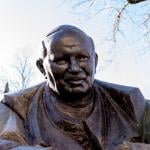WENDI’S QUESTION (paraphrased):
Denominational. Non-denominational. Fundamentalist. Baptist. Mormon. Methodist. Assembly of God. Etc. Etc.: How do we know what type of beliefs these are? Why or why not claim to be ‘Christian’ without anything else added? This is confusing me.
THE RELIGION GUY’S ANSWER:
Wendi has good reason to be confused, especially about the incredibly complex situation in the United States this article will seek to unscramble. By contrast, one or two churches often denominate in European countries and there are fewer minorities. The same was once generally true in developing nations that now have an ever-increasing variety of churches.
Contrast that with the New Testament, where followers of Jesus Christ were simply “Christians” or adherents of “the way.” Jesus himself prayed to God the Father that his followers “may become perfectly one, so that the world may know that You sent me and loved them even as You loved me” (John 17:23).
On the church’s founding day, Pentecost, barriers of language and ethnicity miraculously vanished (Acts 2). The Apostle Paul taught that “there is neither Jew nor Greek” in God’s kingdom “for you are all one in Christ Jesus” (Galatians 3:28) and that Christians share “one Lord, one faith, one baptism” (Ephesians 4:5).
Such is the Christian ideal. But does this spiritual unity require membership within one organization, as Catholicism and Orthodoxy believe (though they have many distinct subgroups)? Are separate organizations based on culture or doctrinal details appropriate?
This is the 500th anniversary year of the Protestant Reformation and The Religion Guy, who’s Protestant, grants that Protestantism’s emphasis on individual conscience initiated the huge variety of separate denominations that number in the untold thousands globally.
For the most comprehensive information about U.S. Christian and non-Christian bodies, Wendi and others can consult the new 9th edition of “Melton’s Encyclopedia of American Religions” (Gale) by Baylor University expert J. Gordon Melton. If your local public library lacks Melton’s e-book or print edition, demand a purchase.
The ever-invaluable “Encyclopaedia Britannica” — in print or electronically at all libraries and searchable online at www.britannica.com — has authoritative articles that explain the major Christian groupings. That said, The Religion Guy will provide this basic roadmap:
In the U.S., the Catholic Church is one of many distinct organizations (“denominations”) and by far the largest.
Christianity’s other ancient branch is Orthodoxy, with two main sectors. Eastern Orthodoxy is united with an honorary figurehead, the Ecumenical Patriarch of Turkey, while so-called Oriental Orthodoxy has certain doctrinal differences. Orthodox churches dominate certain foreign nations but are relatively small in the U.S., where jurisdictions remain divided on the basis of Old World ethnicities.
After Martin Luther’s initial protest of 1517, the Protestant Reformation spread across Europe. There were “Lutherans,” the Calvinist “Reformed” churches (“Presbyterian” in the British Isles), and “Anglican” or “Episcopal” churches stemming from the Church of England. John Wesley’s Anglican revival gave rise to “Methodist” churches that prospered in the U.S.
Others remained apart from those Protestant blocs. Most notable were “Baptists,” who dissented on the doctrine and practice of baptism and became the largest segment in U.S. Protestantism. Many others could be listed.
Confusingly, today there’s often less unity among members within a U.S. Protestant denomination than there is between conservatives and liberals of whatever affiliation.
A distinct new category emerged from a 1906 revival that featured an outburst of glossolalia or “speaking in tongues.” This “Pentecostalism” produced groups like the Church of God in Christ and Assemblies of God. More recently, similar “Charismatic” churches and movements arose. This form of Christianity, sizable in the U.S., is far moreso overseas.
There’s vigorous debate about labeling some groups, especially The Church of Jesus Christ of Latter-day Saints, a.k.a. Mormonism, a U.S.-based faith born in 1830. The LDS church believes it reconstitutes the one true Christianity that differs radically from the Christian religion through history. Mainstream churches dispute that assertion and also the “Christian” standing of other modern groups like Jehovah’s Witnesses or Christian Science.
Wendi also asks about labels for movements or attitudes, as distinct from denominations. “Non-denominational” refers to countless local congregations that are entirely independent. We should also note the “parachurch” label for non-denominational agencies that draw supporters from many different churches.
“Fundamentalist” is a particularly tricky designation. For many, it means “strong-minded Protestants I don’t like.” The term is especially misleading today because it’s applied (wrongly in historical terms) to Muslim factions that employ political terror against the innocent.
In past U.S. usage, fundamentalist meant conservative, Bible-believing Protestants who were relatively non-political, militant in theological advocacy, and kept their churches separate from those with more liberal beliefs. Usually fundamentalism was seen as the hard right of the broader “evangelical” movement. However, the latter term has become problematic due to the current U.S. socio-political situation.
If all that disunity is discouraging, here’s some optimism. After years of labor by top theologians, in 1999 the Lutheran World Federation and Catholic Church issued a detailed agreement on aspects of salvation or “justification” before God that originally sparked Luther’s protest 500 years ago. The heart of this shared pronouncement:
“The Father sent his Son into the world to save sinners. The foundation and presupposition of justification is the incarnation, death, and resurrection of Christ. Justification thus means that Christ himself is our righteousness, in which we share through the Holy Spirit in accord with the will of the Father. Together we confess: By grace alone, in faith in Christ’s saving work and not because of any merit on our part, we are accepted by God and receive the Holy Spirit, who renews our hearts while equipping and calling us to good works.”
During this 500th anniversary year the World Communion of Reformed Churches and the World Methodist Council have joined the prior Lutherans and Catholics in endorsing this accord, and the Anglican Communion is expected to join in later this year.
Full text of the accord: www.cesnur.org/testi/cath_luth_1.htm












